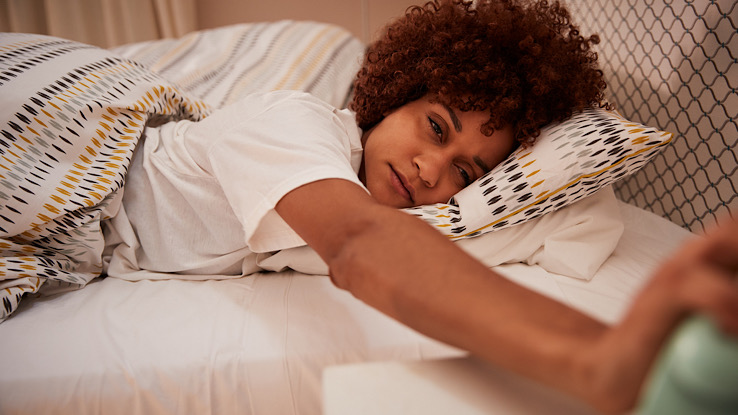New Lenovo Ideacentre Continually Goes to Sleep and Won t Wake Up

Sleep inertia is a feeling of drowsiness and grogginess from not being fully awake. This generally occurs because a person wakes up in the middle of REM sleep, and REM sleep is the deepest part of the sleep cycle. Sleep inertia can be dangerous because you are more prone to mistakes when you are drowsy. In fact, over a million driving accidents worldwide are due to drowsy drivers. Here are some tips on ways to help decrease sleep inertia.
The best way to combat sleep inertia is to maintain your circadian rhythm by going to sleep and waking up simultaneously. When you sleep for a different amount of time each night, you risk waking up in the middle of REM sleep, and this results in sleep inertia that can most damage your body.
2. Caffeine Do's and Don'ts
Caffeine can wake the body up, but that is not such a good thing at night. Caffeine stimulates the nervous system and can help wake you up quicker. Do not be fooled by decaf coffee, either. It still contains caffeine, just not as much as regular caffeinated coffee, so don't plan on drinking that as a replacement in the evening. Research has also shown that a combination of a short nap and a cup of coffee can help wake the body up.
3. Exercise
Working out a couple of times a week helps improve sleep. However, it would help if you did not work out before bed. The adrenaline that comes with exercise can make it very hard to fall asleep. However, exercise in the morning can be a good energy booster and help you get rid of sleep inertia.
4. Be Careful with Naps
Naps can be helpful as an energy boost but should only for a short period. A maximum of 20 minutes is best for most people. Any naps longer than that, you might experience sleep inertia or have trouble sleeping at night. Take naps when it is light outside, and during the early afternoon, so the body does not think it's nighttime.
5. Alarm Clock Remedies
Alarm clocks can cause sleep inertia because they go off at a set time rather than considering what stage of sleep you are in. If you are prone to sleep inertia at your regular alarm time, you might try adjusting the time you go to sleep or what time your alarm goes off. Also, there are alarm clocks that are meant to monitor where you are in your sleep schedule and make sure not to wake you during REM.
6. Keep it Light
Light helps the body's circadian rhythm and indicates it is time to be awake. In addition, standing in a place with a bright light for a minute can help the body wake up more fully. It may help to avoid black-out curtains or blinds unless used explicitly at night. Otherwise, you may feel sleepy during the day in a dark room.
7. Adrenaline Rush
Adrenaline can help wake the body up faster. While starting every morning with a spike in adrenaline on more challenging days may not be suitable, it may help to wake your body up more. A cold shower or a quick jog in place can help get your blood moving.
8. Temperature
If you are having trouble sleeping at night, you may need to adjust the temperature in your room. Make sure that you are comfortable to help you get to sleep faster. If you are experiencing sleep inertia in the morning, try cold water on your face or have a fan blow cold air at you to help wake you up.
9. Wake Up Routine
Take measures in the morning to help wake up your body. Washing your face with cold water can help wash away sleep inertia. Other things that can help are playing music in the morning, getting out of bed, and doing intense movements like jumping or running.
10. Supplements
You can take melatonin supplements before bed to get your body to relax. These can be purchased over the counter and help keep you asleep. If you want to start using supplements, contact your doctor. Being well-rested can help lower your chances of experiencing sleep inertia.
Sleep inertia can be dangerous. Combining these tips may be more effective than using them individually, so try these out and see what works best for you. Using one or more of these can help fight off grogginess and also help keep your sleep schedule. Be careful when driving in the morning and after taking a nap. If you still have trouble with sleep inertia, talk to your doctor about other ways to combat this sleepiness.
Resource Links:
- "Adult Health" via Mayo Clinic
- "The alerting effects of caffeine, bright light and face washing after a short daytime nap" via Clinical Neurophysiology
- "Time to wake up: reactive countermeasures to sleep inertia" via Industrial Health
- "12 Facts About Sleep Inertia" via Valley Sleep Center
- "8 Tips to Sleep Better and Wake Up Refreshed" via Brigham Health Hub
Source: https://www.thehealthfeed.com/healthy-living/sleep-inertia-tips-for-waking-up-refreshed?utm_content=params%3Ao%3D1668962%26ad%3DdirN%26qo%3DserpIndex&ueid=fc95c8ed-2912-41af-8933-7909ba20e180
Post a Comment for "New Lenovo Ideacentre Continually Goes to Sleep and Won t Wake Up"